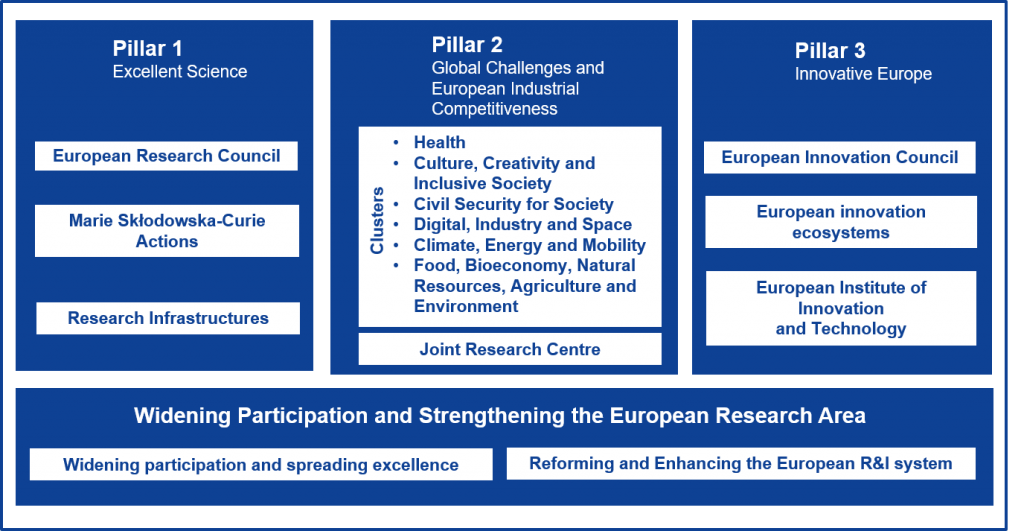An Update on European Funding
 On the 24th December, the UK Government announced that it had reached an agreement with the EU, following months of negotiations. The deal has important implications for European funding opportunities and will affect those involved in UK Research and Development. We have summarised the key things that you need to know below:
On the 24th December, the UK Government announced that it had reached an agreement with the EU, following months of negotiations. The deal has important implications for European funding opportunities and will affect those involved in UK Research and Development. We have summarised the key things that you need to know below:
1. Continued participation in Horizon Europe
Firstly, the UK will continue to participate in a number of EU programmes for the period 2021-2027. This includes Horizon Europe – the EU’s €95.5 billion framework for research and innovation, for which it will have Associated Country status. This is subject to a financial contribution from the UK to the EU budget.
2. The end of Erasmus+
The UK Government has decided not to participate in the Erasmus exchange programme due to the cost of continued membership. It will be replaced with a £100 million national scheme, known as Turing, after the mathematician Alan Turing. This will start in September 2021.
3. The EIC Accelerator - what we know so far
We have received confirmation that UK businesses will remain eligible to apply for grant funding from the EIC Accelerator. However, they will no longer be able to participate in the European Innovation Council Fund, the part of the EIC Accelerator that provides investment through equity or other repayable forms.
4. Eureka Eurostars - continued opportunities for transnational innovation
The UK’s departure from the EU does not affect participation in the Eureka programme and its various funding streams. Therefore, it offers a continued source of European funding opportunities for UK SMEs that engage in transnational innovation. The next competition has a deadline of the 4th February, which you can find more information on here.
5. Freedom of movement ends - implications for researchers
Due to restrictions placed on freedom of movement, UK researchers will require visas for stays of over 90 days in the EU.
The deal answers some pertinent questions surrounding the future of UK participation in EU funding streams. Overall, we are pleased that a deal was reached and that the UK will participate in Horizon Europe. We will keep you updated on any further developments in the coming months, but if you have any questions, please do not hesitate to get in touch.
Horizon Europe: New Horizons for European Funding
2020 marks the end of Horizon 2020, the EU’s biggest ever EU Research and Innovation programme, which has provided nearly €80 billion of funding over 7 years (2014-2020). Succeeding Horizon 2020, Horizon Europe will run from 2021 to 2027 to ensure that Europe remains a world-class leader in Research and Innovation. The European Commission will invest €100 billion into Research and Innovation that will shape the future of Europe, making it the most ambitious programme of its kind.
“With Horizon Europe, we want to build on this success and continue to make a real difference in the lives of citizens and society as a whole.”
-European Commission Vice-President Jyrki Katainen, responsible for Jobs, Growth, Investment and Competitiveness.
Preliminary Structure of Horizon Europe

Like Horizon 2020, the programme will have three pillars. The first will fund excellence in science, supporting frontier research projects designed by researchers through the European Research Council. The second pillar focuses on Global Challenges and European Industrial Competitiveness. It will support research into societal challenges and reinforce technological and industrial capacities. It also sets ambitious EU-wide missions to tackle some of Europe’s biggest problems, including health and climate change. Thirdly, the Innovative Europe pillar aims to increase Europe’s prowess in market-creating innovation and SME growth through the European Innovation Council.
Following the Horizon 2020 Interim Evaluation, the European Commission has implemented several changes to support Research and Innovation across Europe. For example, they will support breakthrough, high-risk innovation through the creation of the European Innovation Council. This will help innovators to create new market opportunities. Additionally, through the launch of new missions with bold, ambitious goals, Horizon Europe will create more impact across Europe. An open science policy will enable better science through collaborative ways of producing and sharing knowledge and data. Further, an emphasis on widening participation will help low Research and Innovation performing Member States to participate in Horizon Europe.
Despite the uncertainty caused by Brexit, we are hopeful that the UK will remain a part of the Horizon Europe research programme. If you'd like to discuss European funding with one of our specialist advisers, please do not hesitate to contact us today.
To stay updated on the grant funding landscape, sign up to our free monthly newsletter, and receive expert insights direct to your inbox.
